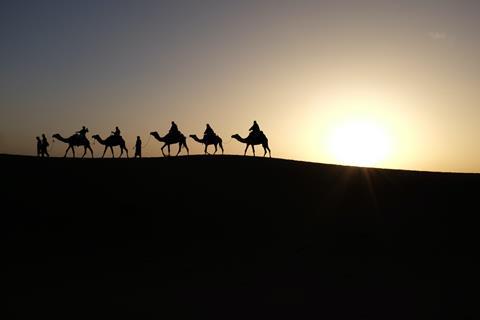At the time of Christ’s birth, ‘peace’ was maintained by the Roman occupying force, but under the surface, spying and oppression countered the risk of rebellion, says Rosemary Hector. Today Palestine and Israel are engulfed in appalling suffering, how far is that from the first Christmas?

We were in southern Italy in spring, looking after a remote farmhouse that belonged to friends. The route to it through an empty countryside of olive groves, and small walled fields was confusing.
As we got to know our surroundings, I became puzzled. Our house and garden, although modest, were fenced and padlocked. Further up the hill, a large empty house, its windows boarded, would be frequented by cars, creeping up the lane without lights at night. At a crossroads nearby, there was often a car parked with someone sitting in it, as if keeping watch. A mile away stood the blackened shell of a seaside café. A recent fire? It was all rather mysterious. Yet to me it felt oddly familiar.
Eventually I recognised why. I grew up in rural Northern Ireland during ‘The Troubles’. Here, there were similarities. Near a friend’s home there was a crossroads where a car had sat, an ever-present watch. There were places you didn’t visit – remote places regularly mentioned in news bulletins – marshy fields where arms would be smuggled across the border, equipment hidden in barns, bodies dumped. If you had to go through these areas, you drove without stopping unless flagged down at a check point.
The remote landscape and climate gave helpful insights into the environment of the first Christmas.
There was a similar atmosphere here. When our host returned, I asked him. ‘Yes’, he said. ‘It’s a strong presence. Underworld crime. Our olive farm’s small. Doesn’t make much money. I’m English, with links to the outside world – not worth the risk from a criminal’s perspective. We’re left alone.’
I was in the middle of a writing project; a commission for Christmas pieces published as A Quickening. The remote landscape and climate gave helpful insights into the environment of the first Christmas. Significantly, the unsettling atmosphere that reminded me of rural Northern Ireland during a time of unrest helped me think about the political situation into which Jesus was born.
Israel was an occupied territory. On the surface it looked peaceful, but the Romans were the controlling power, and Herod their local leader. Research identifies Herod as cruel, ambitious, and insecure, anxious to maintain his position and called ‘King’ to appease him. Roman heads of state were normally called Governors. As an occupying force, the Romans would have had informants. Rebellion was a risk. Suspects were ruthlessly punished.
Joseph and Mary, young and poor, would have been of no interest to spies.
Joseph and Mary, young and poor, would have been of no interest to spies. Equally, their visitors looked low-risk – shepherds were not known for their planning skills, not organised enough to pose a threat.
Read more on Christmas
Posada: Celebrating the nativity journey
It was only when the foreigners, the Magi, arrived that information was filtered up. They looked wealthy and intelligent – powerful. Were they a threat? You will remember that Herod approached, intending to trap them. They knew from a dream to escape. Fast.
In any occupied territory, there is always a risk of insurgence. Many were disappointed that Jesus failed to lead a rebellion against the occupying power. The promise in Isaiah had been that the Messiah would bring release from captivity! Some assumed the captivity was political.
Jesus came into a world characterised by unrest, an atmosphere of mistrust, of accusations of spying, and where many were oppressed by an occupying regime. He didn’t bring a political solution. Instead, he offered a more profound and personal release.
A Quickening, a series of Christmas reflections by Rosemary Hector is published by Muddy Pearl.




































No comments yet